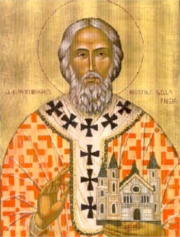
He was half-blind nearly from birth, which meant he had to read books and other materials so carefully that he memorized them. As in, forever. He was half-lame, so he had to overcome pain and discomfort in order to take part in the normal activities of his profession. He believed that the best theological explorations were made by those not explicitly exploring theology, hence he was devoted to "secular" poetry and music. Naturally, in the free-wheeling days of the early 20th century Anglicanism, such a man could become a bishop.
Temple was ordained a priest in 1910, but served in a variety of positions in both the academic realm and in that of social action. He was well-known as, of all things, a labor negotiator, especially on behalf of the coal mining industry in England. In recognition, he was appointed Bishop of Manchester in 1921.
There is a remarkable moment in his career, in about his tenth year as bishop, when he was leading a revival meeting [Yes, we have those. It's surprising to some how rich is our tradition.]. He asked the congregation to pause in singing the hymn "When I survey the wondrous cross" and asked them to softly speak the final stanza, but only if they truly wanted to know Jesus better than they did. Almost two thousand people whispered
Were the whole realm of nature mine,
That were an offering far too small;
Love so amazing, so divine,
Demands my soul, my life, my all.
It is recognized as one of the great moments in Anglican history, as it was meaningful not only to those present but to all who heard the tale. Whispered hymns became rather popular for a time because of this.
When the Germans were bombing Britain, and the Church of England needed a new Archbishop of Canterbury, it was Temple who was appointed. The health problems that vexed him since childhood were exasperated by the demands of his office in wartime, and he died just two years later. Despite this, he is recognized by quite a few as the greatest Archbishop of the 20th century as he balanced liturgical action with social action and tempered the voices of vengence in his own society.
O God of light and love, you illumined your Church through the witness of your servant William Temple: Inspire us, we pray, by his teaching and example, that we may rejoice with courage, confidence, and faith in the Word made flesh, and may be led to establish that city which has justice for its foundation and love for its law; through Jesus Christ, the light of the world, who lives and reigns with you and the Holy Spirit, one God, now and for ever. Amen.
November 7: Willibrord of Utrecht [658-739]

Willibroard was one of the earliest of the Celtic Christian missionaries not to be sent to the wild reaches of the British Isles, but to the countries that are now the Netherlands and Denmark. He is noted on the calendar as he marks the relationship between these cultures in their pilgrimage from paganism to Christianity.
O Lord our God, you call whom you will and send them where you choose: We thank you for sending your servant Willibrord to be an apostle to the Low Countries, to turn them from the worship of idols to serve you, the living God; and we entreat you to preserve us from the temptation to exchange the perfect freedom of your service for servitude to false gods and to idols of our own devising; through Jesus Christ our Lord, who lives and reigns with you and the Holy Spirit, one God, for ever and ever. Amen
November 10: Leo the Great [391-461]

Yes, there are popes on our calendar, too; at least a few who were recognized before the Rome/England split of the 16th century.
Leo the First had many accomplishments during his papacy, as he actively combated several heresies that threatened the unity of Christianity. I've always thought his most interesting moment was when he met with Attila the Hun and successfully negotiated with the Eastern leader to prevent the latter's invasion of what's now Italy.
Ironically for one on our calendar, he was significant in formalizing the spiritual authority and infallibility of the pope. This is ironic, of course, as it was opposition to this authority that gave birth to the so-called "English Church", later to be known formally as the Church of England and all of its partners in the Anglican Communion, including our own American version.
[As I write this, I realize that the Episcopal Church has been known during my lifetime as "The Protestant Episcopal Church of the United States", "The Episcopal Church of the United States", and nowadays simply as "The Episcopal Church". Why three name changes in just half a century? Power and politics, my brothers and sisters. There is no practical reason.]
More of Leo the Great may be read here.
O Lord our God, grant that your Church, following the teaching of your servant Leo of Rome, may hold fast the great mystery of our redemption, and adore the one Christ, true God and true Man, neither divided from our human nature nor separate from your divine Being; through Jesus Christ our Lord, who lives and reigns with you and the Holy Spirit, one God, now and for ever. Amen